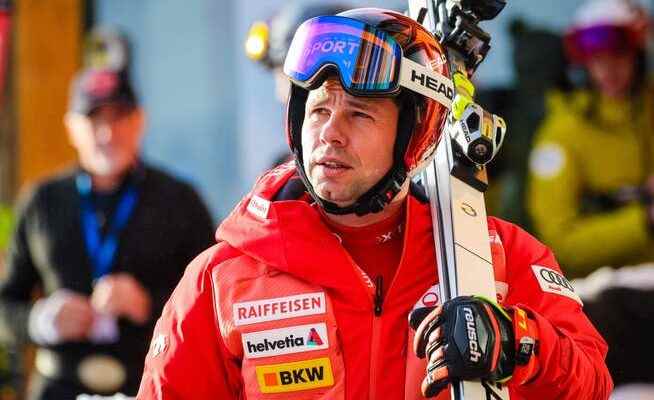The Olympic downhill champion speaks for the first time about the reasons for ending his career in Kitzbühel. The longer you listen to Feuz, the more logical the move seems.
Beat Feuz has felt for some time that he has stepped away from the best version of himself, just a little bit, but a little bit is no small matter.
The media center in Bormio, near the finish of the notorious Stelvio downhill ski run, is located in an unadorned room with almost no natural light. The framework suited the main actor on this St. Stephen’s Day, because Beat Feuz is an athlete who has always done without frills, who doesn’t care for glitter and glamour.
It was in this room that the 35-year-old from Emmental spoke for the first time about the reasons for the decision to end his career after the two downhill runs in Kitzbühel on January 20th and 21st; he had just announced this last Wednesday. It wasn’t an emotional, but a no-frills performance, and the longer you listened to Feuz, the more logical the step seemed, which had previously had something surprising – not only for the public, but also for people who have worked closely with him for years.
Being away from home is becoming increasingly difficult for Feuz
“At some point it’s just enough,” said Feuz, “I’ve had enough of skiing, I’ve experienced enough and achieved enough.” It would be different if being a racing driver only meant racing, two, two and a half minutes full throttle. But these two, two and a half minutes are the concentrate of so much more, for example many longer absences from home, which Feuz, the father of two girls, finds increasingly difficult.
Feuz can name the day and situation when he realized enough was enough. The first downhill of the World Cup season should have taken place in Lake Louise on November 25th. “During the visit, I had to realize that this is no longer what I want,” said Feuz. In the finish area below, he called his partner and told her to stop. The partner was initially puzzled, but from then on the two only talked about when, where and how exactly this great skiing career should end.
Before the start of the season, Feuz had emphasized that he had not had any serious thoughts of retiring since winning the Olympic downhill on February 7th. What was striking at most was that he communicated differently in relation to his goals. He spoke again about the focus on highlights – and not about a fifth crystal ball for the best downhill skier of the winter. “In the years when I felt that I had a chance to fight for a ball, I also went to the limit on those routes that I didn’t really like,” said Feuz in an NZZ interview.
A single edge walk since 2012
These years only began after the 2017 world championship title in St. Moritz. At that time, Andreas Evers was the new head of downhill at Swiss Ski, and the Austrian didn’t see why Feuz shouldn’t be able to ski at the highest level from the first to the last race of the season. Feuz was initially irritated by this attitude of entitlement, after all his skiing career has been a single edge walk since the threatening infection in his left knee in 2012.
But Feuz developed into a model of consistency among the world’s best, he won the downhill World Cup in 2018, 2019, 2020 and 2021, four times in a row, otherwise only Franz Klammer managed to do that. Bernhard Russi, once Klammer’s biggest rival and then the Swiss authority for decades when it came to explaining downhill skiing, compared the two exceptional figures in 2021 like this: “Klammer took a lot more risks. Beat doesn’t have to. He has a kind of reservoir and can count on it being enough.” Russi also said: “Beat drives as compact as a cannonball – and with an incredible feeling. He’s the most soulful downhiller I’ve experienced.”
Feuz has felt for some time that he has stepped away from the best version of himself, just a little bit, but a little bit is no small matter. “The body no longer feels the same as it did four or five years ago, I noticed before the season that it would be difficult to keep an eye on the ball,” said Feuz. The body, not just the darned left knee, reacted more strongly to training days, especially to ski training, but also to strength and conditioning training.
“This is how I stay true to my line”
There were years when Feuz didn’t want to talk about the condition of that knee anymore, and eventually he wasn’t even asked about it anymore. But now he admitted: “It was sometimes worse and a bigger fight than people thought.” He has to invest more and more time to get his body in shape so that he can take the heavy loads off his knees. “I just don’t want to do that anymore. And even if it were me, there would be no guarantee that I would be able to start without pain.”
Feuz did not do the first downhill training in Bormio, not because of his knee, but because he had had a cold for the past few days. He said he will only race on Wednesday and Thursday when he feels he is in full control. What really counts for him again: the downhill runs in Wengen and Kitzbühel, where he has won three times each. Driving there again and then retiring in the middle of the season, without another World Cup participation in February, is a question of consistency for Feuz. “I have always said that these are the biggest races for me. That’s how I stay true to my line.”
